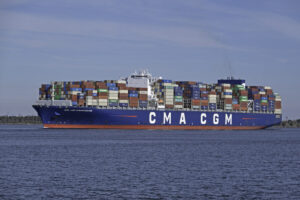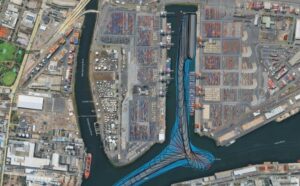A new white paper by APM Terminals (APMT) and international consultancy Systemiq highlights a unique opportunity for Nigeria to electrify its containerised trade at scale.
The report suggests that Nigeria could bypass fossil-powered infrastructure and align with the global shift towards low-emission logistics.
Presented at the Decarbonising Infrastructure in Nigeria Summit in Abuja, the report argues that electrification could mobilise up to $830 million in investments by 2030, create higher-skilled local jobs, save 390 ktCO2e in greenhouse gas emissions, reduce air pollution, improve public health, and strengthen power supply reliability.
READ: APMT Pier 400 debuts fully electric auto-strad
Globally, more than 40 ports—from Jordan to Brazil and India—are rolling out electric container-handling equipment, investing in low-emission power infrastructure, and digitising logistics operations.
On land, electric trucking corridors are gaining momentum, with successful pilots in Kenya, China, and India demonstrating that freight electrification is feasible and scalable in emerging markets.
The white paper stresses that public-private collaboration is essential for Nigeria to unlock this potential, starting with short-term actions and building towards sustained progress over the next 5 to 10 years.
The report identifies reliable, affordable power supply and equipment electrification as parallel priorities.
READ: APMT Valencia unveils €28 million upgrade for larger vessels
“Our findings clearly show that the time to act is now,” said Eveline Speelman, Partner in Systemiq.
“Electrification aligns with upcoming investment cycles and can drive progress on key national priorities. With nearly 60 per cent of container terminal concessions approaching renewal, the moment is right to embed electrification into the next wave of logistics infrastructure investment.”
APMT operates two container terminals in Nigeria—Apapa in Lagos and WACT in Onne—as well as a container depot in Kano.
According to Frederik Klinke, CEO of APM Terminals Nigeria: “Containerised trade is a vital backbone of economic development in Nigeria, and we view the country as a key growth market. We believe that electrification plays an integral part in bringing operations to the globally most advanced level.
“This white paper outlines a clear roadmap for how public-private partnerships can unlock electrified and decarbonised operations. From our global experience as a terminal operator, we know that beyond lowering emissions, electrification improves the working environment, reduces air and noise pollution, and delivers tangible benefits to neighbouring communities.”
The white paper, available on the APMT website, provides a detailed roadmap for overcoming barriers and moving from pilot projects to large-scale implementation across Nigeria’s supply chain.
Earlier in April, Nigerian President Bola Tinubu announced a $600 million investment by Maersk to improve Nigeria’s port infrastructure and enable additional container shipping services in Nigerian ports. The President stated that this investment will supplement the administration’s existing $1 billion investment in the renovation of Nigeria’s eastern and western seaports.








